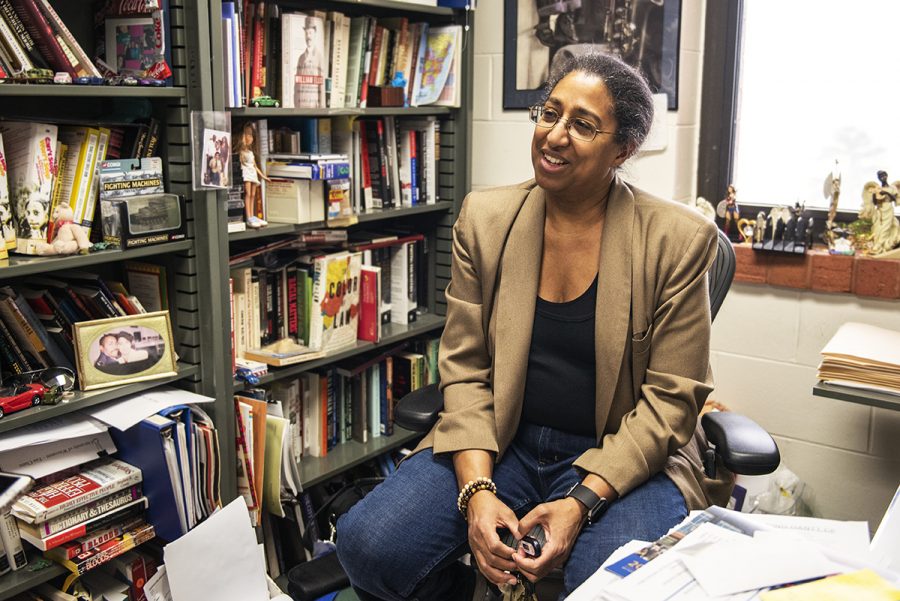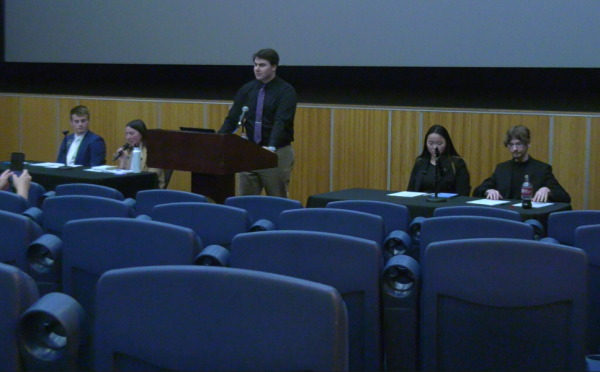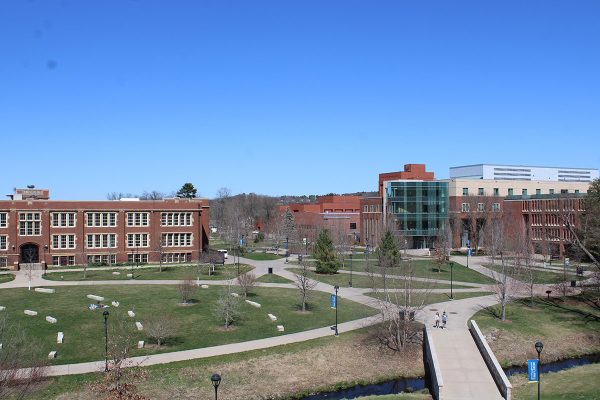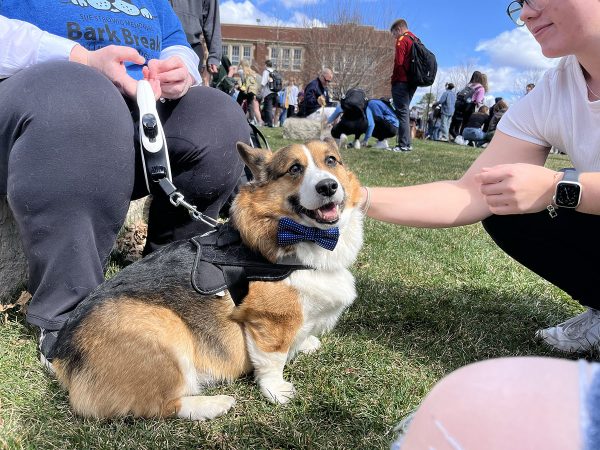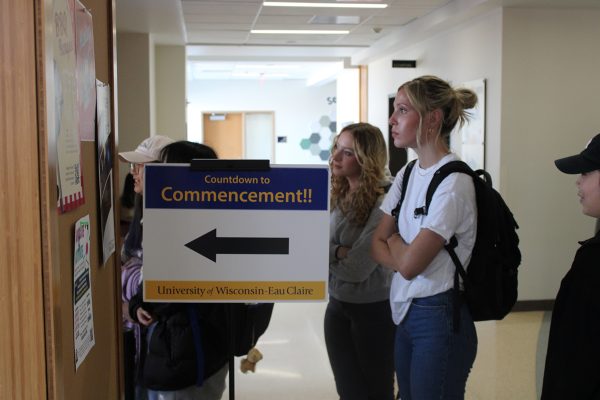Professor utilizes historical knowledge and passion to spur local and state-wide progress
Selika Ducksworth-Lawton, UW-Eau Claire history professor and human rights activist, was recently recognized as one of Wisconsin’s 42 most influential black leaders
Photo by Elena Dawson
Selika Ducksworth-Lawton, professor in history and women’s, gender and sexuality studies, is an active leader on the local and state-wide levels. She was named one of Wisconsin’s most influential black leaders by Madison 365 in December.
Most leaders are aware of public response to their efforts, reach and impact. For Selika Ducksworth-Lawton — history professor at UW-Eau Claire, vice president of Uniting Bridges of Chippewa County and executive board member for the Chippewa Valley Chapter of the American Civil Liberties Union of Wisconsin — this was not exactly the case.
Ducksworth-Lawton was recently named one of Wisconsin’s 42 most influential black leaders by Madison 365, a Madison-based magazine that, according to the publication’s website, strives to foster conversation, community, action and leadership between and for multicultural communities.
Candidates for the list were nominated anonymously, Ducksworth-Lawton said, and the professor had no idea she was considered for the honor. In fact, she was not aware of her recognition until she began receiving various congratulatory words from acquaintances and colleagues after the list was published on Dec. 22.
“It was actually a shock to me,” Ducksworth-Lawton said. “But I am grateful to whoever nominated me. It’s nice to be recognized.”
Ducksworth-Lawton said she thinks her work with the ACLU likely had something to do with this recognition. ACLU is an organization that, according to its website, aims to protect the rights and liberties of individuals in all 50 states, Puerto Rico and Washington, D.C. She said her position with the organization allowed her to expand her visions to, and secure connections in, bigger cities like Madison and Milwaukee.
“There’s this impression in Milwaukee and Madison that there are no black people up here,” Ducksworth-Lawton said. “My presence in Milwaukee and Madison may be why people actually know we’re up here.”
Ducksworth-Lawton said she has always been a strong advocate for human rights, particularly of vulnerable populations. She sees it vital that bigger cities are made aware of northwestern Wisconsin’s multiculturality and subsequent diverse needs. She said she wants it known that rural white and multicultural people are able and willing to work together.
In the beginning of her career, Ducksworth-Lawton said she originally planned to work for the State Department. Instead, she was recruited to work for the Department of Defense. She specializes in twentieth-century African-American military, national security and Civil Rights history. Ducksworth-Lawton said she came to the Chippewa Valley in 1993 for the history professor position she holds today.
“The military uses history as a decision-making tool, and history is the ultimate decision-making tool,” Ducksworth-Lawton said. “It’s the only thing we have that shows how actual people act in actual circumstances. It’s not theory, it’s what people do. Almost everything comes from history. To be a historian puts you at the center of everything.”
Louisa Rice, the history department chair at UW-Eau Claire, has worked alongside Ducksworth-Lawton since she came to the university in 2009. Rice said she worked most closely with Ducksworth-Lawton in the creation of a new Africana studies certificate that will be implemented in the fall.
Rice said Ducksworth-Lawton’s recent recognition was not unexpected.
“We’ve known for a long time how much work she does for the community,” Rice said. “She has this real enthusiasm and passion for the things she cares about. She really cares and that caring is based in a very profound knowledge.”
Through Uniting Bridges, Ducksworth-Lawton organizes Eau Claire’s Juneteenth and Martin Luther King celebrations. In 2015, in the midst of multiple instances of police brutality, Ducksworth-Lawton also teamed up with the Eau Claire Police Department in an effort to build trust between multicultural communities and the police. The work she did with the police is what led her to ACLU, she said.
On top of her advocacy roles at both the local and state-wide level, Ducksworth-Lawton said she is a proud mother of two, wife and active member of her Catholic church. Her children, husband and church connections are part of the reason why she was pushed into community happenings, she said. Her ultimate goal, she said, is to make the world a better place for her children, husband, colleagues and their friends.
Actually making progress and taking action is a matter of applying history, Ducksworth-Lawton said.
“If we can restore some respect, and if we can restore some unity and some shared values, then we can propel our country forward,” Ducksworth-Lawton said. “I want to bring people together, to help people understand each other, to help us advance projects that advance our community.”
The current focus of Ducksworth-Lawton and her colleagues is on rectifying the problems of over-regulation, and subsequent mass incarceration, in America and allocating more resources to education and mental health, she said. She is also in the process of publishing a book titled “Honorable Men: Armed Self Defense and the Deacons for Defense and Justice” and has worked to create a Student ACLU in Eau Claire, which will have its first meeting in March.
“We want students to be ready and organized, able to protect their rights, able to observe protests,” Ducksworth-Lawton said. “Able to live their lives without having to deal with abusive power. Students are a vulnerable population. ACLU feels it’s very important for students to have a voice.”
Ducksworth-Lawton said she plans to teach for a few more years but hopes to eventually return to policy work for the U.S. or United Kingdom governments. She said she ultimately wants to guide her children and students to success in their characters and careers. She would also love to get her black belt, she said.
While Ducksworth-Lawton said she is proud of her work, and thankful that her work is being recognized state-wide, she stresses that she is not alone in her efforts.
“I’m not the only black leader up here,” Ducksworth-Lawton said. “We have a number of people who are doing this work. It’s nice that they’re beginning to recognize people from this area and hopefully I’ll be the first of many.”
Reisdorf can be reached at [email protected].
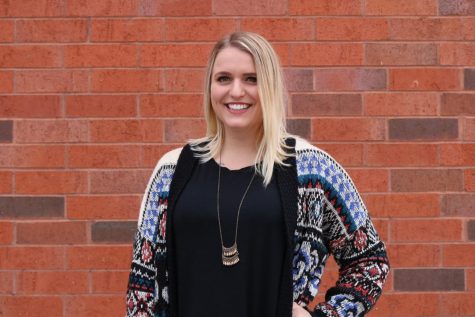
Taylor Reisdorf is a graduate student in the English program who revels in both telling and engaging with compelling stories. This is her seventh semester with The Spectator. She prides herself in her adaptability and desire to continuously experience, learn, and appreciate new things.

